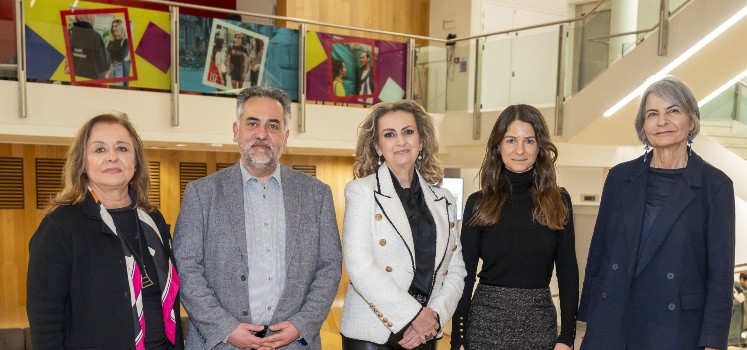
What are the key barriers to female entrepreneurship in Greece—cultural, economic, and structural? How do access to finance, professional networks, and societal perceptions shape women’s entrepreneurial journeys? These critical issues were explored in a public event organised yesterday (Thursday 20 February) at the London School of Economics by the Hellenic Observatory, LSE’s Centre for Research on Contemporary Greece & Cyprus, in collaboration with the UK-based Hellenic Female Leaders network.
The event, chaired by Centre Director and holder of the El. Venizelos Chair of Contemporary Greek Studies at the LSE, Prof Vassilis Monastiriotis, hosted a panel of distinguished speakers, including Stella Kasdagli, co-founder of ‘Women On Top’, Sophia Kounenaki-Efraimoglou, First Vice-President of the Athens Chamber of Commerce and Industry and Elected President of the National Chamber Network of Greek Women Entrepreneurs (EEDEGE), and Antigone Lyberaki, Professor of Economics at Panteion university.
The panel discussed the economic and cultural barriers to female entrepreneurship, the necessary policy changes and also drew comparisons with European and international experiences in overcoming the challenges faced by women in this traditionally male-dominated field. The conversation brought to the forefront challenges women encounter in the business world, along with potential progress pathways
Ms Kounenaki- Efraimoglou discussed the importance of female entrepreneurship for economic progress, emphasizing the need for resilience, vision, and innovative ideas to navigate the challenges. She noted: “Empowering women is not only about providing equal opportunities but also promoting development for society as a whole”. The Vice-President of ACCI highlighted the Chamber’s commitment to supporting and empowering women entrepreneurs through various programmes and initiatives. Despite significant progress, women still face barriers such as access to funding, lack of networking and mentorship, lack of entrepreneurial skills, and societal perception-based challenges such as lack of self-confidence and fear.
Professor Lyberaki highlighted three key areas of focus: gender role expectations, socio-cultural dimensions, and the entrepreneurial environment, including access to resources, capital, and networks. Drawing international comparisons, she noted that while Greece has made progress in gender equality, perceptions often lag behind reality due to conservative stereotypes rooted in family roles and the division of labour in households, which slow the pace of change. She emphasised the need for continued efforts to close the gender gap, particularly in the private domain, and warned against complacency, as subjective perceptions can impact objective performance. Lyberaki remarked, "Unless we change our perceptions, our eyes cannot see reality."
Ms Kasdagli presented findings from Women On Top's research showing that only 25.1% of enterprises in Greece are run by women, with most being small businesses driven by necessity. High-tech female entrepreneurs face even greater challenges, with only 16% of Greek start-ups having a woman in their founding team and just 3% founded by all-female teams. Kasdagli discussed the many faces of the gender financing gap, including the low participation of women in high-tech fields, the closed nature of funding ecosystems, and systemic biases against women entrepreneurs. She stressed the need for systemic changes, including better access to resources, capital, and networks, as well as targeted financial literacy initiatives. To bridge the gap, she outlined a twofold strategy including ecosystem-wide reforms to create a more inclusive environment, and empowering women through financial literacy, upending social stereotypes, and encouraging participation in STEM fields.
The event was marked by a lively Q&A session with the audience engaging on key issues reinforcing the necessity of continued dialogue and collaboration between policymakers, business leaders, and civil society to foster a more inclusive entrepreneurial landscape in Greece.
Professor Monastirioits commented “Female entrepreneurship is an important issue not only as a matter of inclusion and fairness, but crucially also as a matter of economic efficiency – with an increasing realisation that women can bring managerial and leadership qualities that may be lacking in the male-dominated business world. Our engagement with this issue at the Hellenic Observatory is part of our wider ambition to study key societal and economic issues for Greece and Cyprus, relating them to debates in the international literature and drawing robust and contextualised conclusions that can inform policy and contribute to public dialogue and societal transformation”.
Mahi Georgakopoulou, President, Hellenic Female Leaders UK said: "Empowering the next generation of female leaders is not just an investment in women—it is an investment in a more innovative, inclusive, and globally competitive future. Greek women of the diaspora have always been catalysts for progress, bridging cultures, leading innovation, and driving change both in Greece and across the world. Today, their role is more crucial than ever. Through our cooperation with LSE, we are harnessing the collective power of these global changemakers to open new pathways for the next generation of female leaders. Together, we are not just shaping careers but shaping the future of leadership in Greece and beyond."